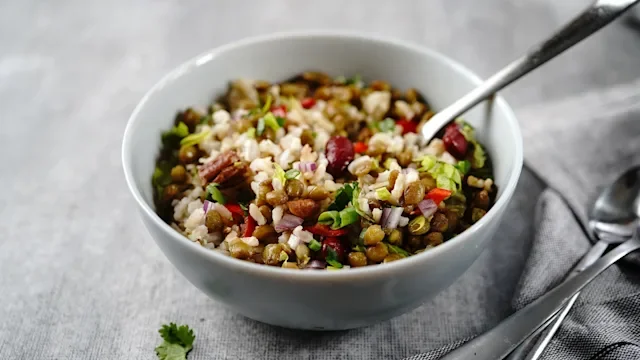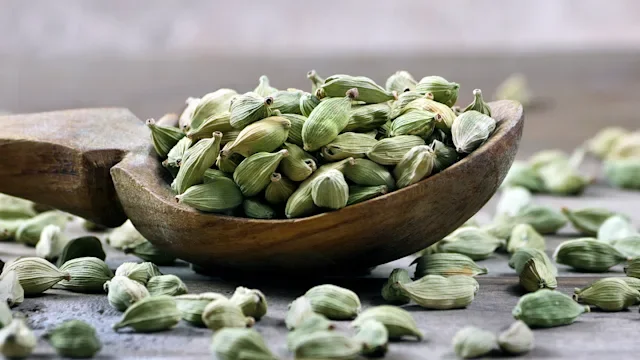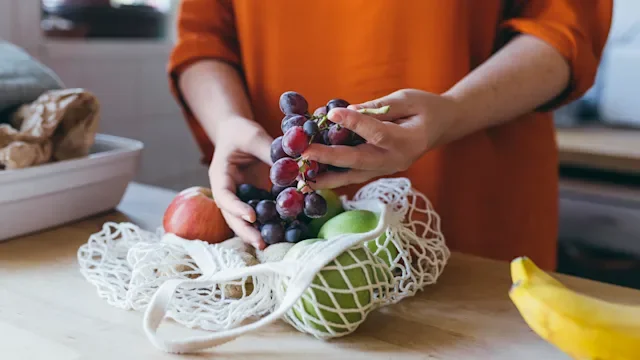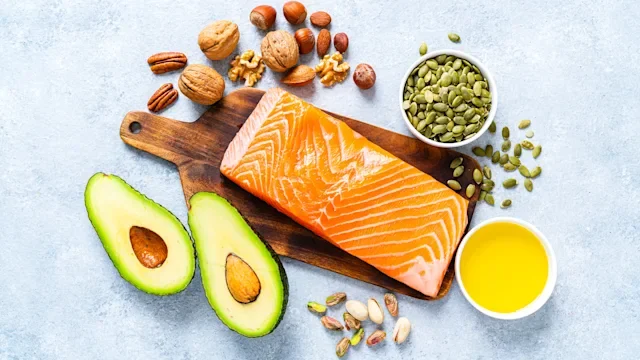Key takeaways:
Including certain foods and nutrients in your diet may help prevent heart disease. These include foods that are high in fiber, unsaturated fat, and vitamins.
Some examples of heart-healthy foods include fruits and vegetables, oily fish, and nuts.
Avoiding certain foods and drinks may also support your heart health. These include salty, sugary, and high-fat foods, as well as alcohol.
Heart disease is the leading cause of death in America, so it’s important to find ways to protect your heart. In addition to lifestyle choices — such as being more active, lowering your stress, and getting a good night’s rest — eating healthy plays a big role in improving your heart health.
Best foods for heart health
Here are nine foods that are good for your heart health. Remember, there’s no single food that can prevent or treat heart disease. So you’ll want to eat these as part of an overall healthy diet to reap the maximum benefits.
1. Oily fish
Salmon, trout, and tuna are “fatty” or “oily” fish. They’re a good source of omega-3 fats, which help lower triglycerides (a type of fat in the blood). High triglycerides are linked to an increased risk of heart disease and stroke.
Studies show that fish and seafood may reduce the risk of:
Heart disease
Sudden cardiac death (death from a heart-related event)
In particular, replacing less-healthy proteins — such as processed or red meat — with fish can help improve your heart health.
Aim to eat 8 oz of fish or seafood (around two servings) per week. Some of the best choices of seafood and fish to eat include:
Catfish
Clams
Cod
Crab
Flounder
Haddock
Herring
Mackerel
Oyster
Salmon
Tilapia
Trout
Tuna
2. Vegetables
Many vegetables play a role in heart health because they contain protective nutrients, such as fiber, vitamins, and minerals.
Read more like this
Explore these related articles, suggested for readers like you.
Vegetables that are high in vitamin C and beta carotene are great choices. This is because these nutrients work as antioxidants, which are associated with a lower risk of heart disease.
Examples of vitamin C-rich vegetables include:
Bell peppers
Broccoli
Tomatoes
For veggies that are high in beta carotene, try:
Sweet potatoes
Carrots
Spinach
While these veggies contain heart-healthy nutrients, eating a variety of them is more important than including any single vegetable in your diet. Aim for 2 to 3 cups of vegetables each day.
3. Leafy greens
Add kale, chard, and spinach to your meals. These deep-green, leafy vegetables get a special shoutout because of their noted heart-health benefits. Studies show that leafy greens are associated with a lower risk of heart disease and stroke.
Researchers are still trying to understand how leafy greens protect heart health. But they suspect it’s due to a combination of nutrients, including:
Calcium
Antioxidants
4. Berries
Fruit contains fiber, vitamins, minerals, and antioxidants that are good for your heart. And berries — such as blueberries, strawberries, blackberries, and raspberries — are excellent choices. They are rich in fiber as well as vitamins, minerals, and antioxidants.
Studies also suggest that berries, in particular, may lower LDL (“bad” cholesterol), blood glucose and A1C levels, and blood pressure.
Scientists think that berries may help improve cholesterol because they contain many polyphenols, such as quercetin and anthocyanins. These are powerful compounds with high antioxidant activity.
5. Legumes
Legumes — such as beans, lentils, and chickpeas — are well-known for their high fiber and protein content. They also are low in saturated fat. This makes beans a heart-healthy protein alternative to red meat. Because of their high fiber content, beans may also help lower cholesterol levels.
If you use canned beans, choose a low- or no-sodium option. If you have a can that contains salt, rinse the beans before eating to lower your sodium intake. Too much salt can lead to high blood pressure.
6. Extra virgin olive oil
Good-quality olive oil is a heart-healthy food. Olive oil is rich in polyphenols, which are plant compounds that help fight inflammation. They also may help lower the risk of heart disease.
Specifically, the polyphenols in olive oil can help lower cholesterol levels and may help reduce hypertension. The monounsaturated fats in olive oil are also good for heart health.
Look for olive oil brands that label the polyphenol content. Choose an oil with at least 250 mg/kg polyphenols.
While olive oil is associated with a lower risk of heart disease, too much can be a problem. Stick to around 2 tbsp of olive oil per day.
7. Dairy products
Milk and yogurt are an important part of the DASH diet. They contain heart-protective nutrients such as protein, calcium, and magnesium, which help regulate blood pressure.
The DASH diet recommends two to three servings of dairy products per day. For reference, a serving is 1 cup of milk or yogurt or 1.5 oz of cheese.
While most recommendations emphasize low-fat dairy, full-fat or whole milk dairy may be just as beneficial.
8. Oats and other whole grains
All whole grains are good for heart health, since they contain fiber. But oats and barley stand out because they contain a type of soluble fiber called beta-glucan. This compound helps reduce your risk of heart disease by lowering LDL cholesterol and inflammation. It also helps control blood sugar levels.
9. Nuts and seeds
Nuts are good for heart health. Both tree nuts and peanuts contain a mix of nutrients that have heart-healthy benefits. These include unsaturated fats, fiber, and antioxidants.
Nuts may help regulate cholesterol and blood pressure. That could be why studies suggest that eating nuts is associated with a reduced risk of heart-related events and deaths.
The heart-health evidence is especially strong for:
Walnuts, which contain omega-3 fats
Almonds, which contain vitamin E and other anti-inflammatory compounds
Seeds such as flax and chia, which are plant-based sources of omega-3s
What diets are good for heart health?
Certain diets — like the DASH and Mediterranean diets — are good for your heart. For example, the DASH diet helps lower blood pressure by limiting salt. And the Mediterranean diet reduces heart disease risk by lowering inflammation, increasing HDL (“good” cholesterol), and improving blood pressure.
These diets tend to be rich in:
Lean protein
Healthy fats such as omega-3 fatty acids
Foods and drinks to avoid for heart health
In addition to prioritizing heart-healthy foods, it’s also important to cut back on foods that contain extra:
Ultra-processed foods are especially high in these ingredients and have been linked to an increased risk of heart disease and a 9% higher risk of dying from heart disease. Ultra-processed foods are also lower in fiber and other nutrients.
Here are examples of ultra-processed foods that are best avoided:
Sweetened beverages such as soda
Salty snacks such as chips and pretzels
Candy and chocolate
Fast food such as pizza, burgers, and fries
Chicken nuggets and fish sticks
Processed meats such as bacon and sausage
Baked goods such as pastries, cookies, and cakes
Alcohol and heart health
Cutting back on alcohol is also important to protect your heart. This may come as a surprise, especially if you’ve heard that red wine improves heart health. But a lot of research has found that any amount of alcohol can be harmful.
In fact, alcohol can actually harm your heart by:
Contributing to a fast or irregular heartbeat
The bottom line
Your food choices can affect your risk of developing heart disease. Foods such as berries, oily fish, and leafy greens are examples of heart-healthy choices. But keep in mind that no single food protects heart health. Your overall diet matters most.
When possible, choose whole and unprocessed foods and keep ultra-processed foods and alcohol to a minimum. And don’t forget to move your body regularly and carve out time for rest and stress-lowering activities. Together, these steps can improve your heart (and overall) health.

Why trust our experts?



References
American Heart Association. (2018). The benefits of beans and legumes.
Aune, D., et al. (2017). Fruit and vegetable intake and the risk of cardiovascular disease, total cancer and all-cause mortality-A systematic review and dose-response meta-analysis of prospective studies. International Journal of Epidemiology.
Basu, A., et al. (2010). Berries: Emerging impact on cardiovascular health. Nutrition Reviews.
Carson, J. A. S., et al. (2020). Dietary cholesterol and cardiovascular risk: A science advisory from the American Heart Association. Circulation.
Coates, A. M., et al. (2018). Nuts and cardiovascular disease prevention. Current Atherosclerosis Reports.
George, E. S., et al. (2018). The effect of high-polyphenol extra virgin olive oil on cardiovascular risk factors: A systematic review and meta-analysis. Critical Reviews in Food Science and Nutrition.
Hollænder, P. L., et al. (2015). Whole-grain and blood lipid changes in apparently healthy adults: A systematic review and meta-analysis of randomized controlled studies. The American Journal of Clinical Nutrition.
Huang, H., et al. (2016). Effects of berries consumption on cardiovascular risk factors: A meta-analysis with trial sequential analysis of randomized controlled trials. Scientific Reports.
Juul, F., et al. (2021). Ultra-processed foods and incident cardiovascular disease in the Framingham Offspring Study. Journal of the American College of Cardiology.
Kris-Etherton, P. M. (2014). Walnuts decrease risk of cardiovascular disease: A summary of efficacy and biologic mechanisms. The Journal of Nutrition.
Li, N., et al. (2021). Green leafy vegetable and lutein intake and multiple health outcomes. Food Chemistry.
National Heart, Lung, and Blood Institute. (2021). DASH eating plan.
Ojagbemi, A., et al. (2021). Dietary intakes of green leafy vegetables and incidence of cardiovascular diseases. Cardiovascular Journal of Africa.
Potì, F., et al. (2019). Polyphenol health effects on cardiovascular and neurodegenerative disorders: A review and meta-analysis. International Journal of Molecular Sciences.
Rimm, E. B., et al. (2018). Seafood long-chain n-3 polyunsaturated fatty acids and cardiovascular disease: A science advisory from the American Heart Association. Circulation.
Schmidt, K. A., et al. (2021). Impact of low-fat and full-fat dairy foods on fasting lipid profile and blood pressure: Exploratory endpoints of a randomized controlled trial. The American Journal of Clinical Nutrition.
Tosh, S. M., et al. (2020). Emerging science on benefits of whole grain oat and barley and their soluble dietary fibers for heart health, glycemic response, and gut microbiota. Nutrition Reviews.
U.S. Department of Agriculture and U.S. Department of Health and Human Services. (2020). Dietary Guidelines for Americans, 2020-2025, 9th Edition.
U.S. Food and Drug Administration and U.S. Environmental Protection Agency. (2021). Advice about eating fish.
















